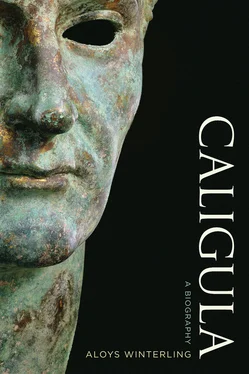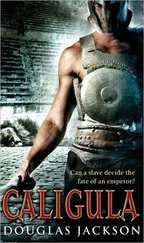The reader will not be surprised that all that on this occasion also availed nothing. Within less than a year the first conspiracy against Claudius was mounted, and it resembled the great conspiracy of mid-39. This time the central figures were Annius Vinicianus in Rome and the governor of Dalmatia, Arruntius Camillus Scribonianus. Once more members of the senatorial aristocracy participated in large numbers. The uprising failed because the troops refused to take up arms in a civil war. The new emperor, who was fifty at the time of his ascent to the throne, had learned a thing or two, however. Every visitor had to undergo a body search before being admitted into his presence. When the emperor paid ailing, bed-ridden senators the honor of a visit, the rooms of the house were thoroughly inspected first, and every blanket and pillow was carefully examined. The importance of freedmen as trusted figures in the emperor’s entourage continued to grow. A second attempt was made to conquer Britain, this time with success. But none of that helped either. Unlike in Caligula’s time, a number of years later a conspiracy within the family succeeded, with Agrippina again at the center of it. Claudius, having recalled her from banishment and later brought her to the palace as his wife, died after Agrippina served him a dish of poisoned mushrooms so that her son Nero could become emperor.
And what was the reaction of the aristocracy to Claudius’s demise? Seneca, who had been accustomed to expressing his gratitude for the emperor’s “divine hand,” wrote a biting satire on him almost before the body was cold, and expressed what everyone was thinking. If Caligula, who had dared aspire to founding a monarchy in plain view in Rome, was condemned posthumously as a “madman,” then Claudius, who had tried to spare the aristocracy, was known after his death as a “fool.”
Epilogue to the English Edition
“Mad emperors are an embarrassment to serious historians,” as the ancient historian Catherine Edwards once aptly observed ( Classical Review 41 [1991]: 407). On the other hand they hold a special fascination for a broader public with an interest in history, as can clearly be seen from the success of popular biographies, historical novels, or spectacular films. The present biography of Caligula takes this as its point of departure and has two aims. The brief life of this emperor is narrated in a form that preserves the tension and drama of events as they unfolded and that is meant to be accessible to general readers. At the same time an attempt has been made to solve the historical problem this emperor presents with a new interpretation.
The narrative approach chosen has required the exclusion of two elements: Competing hypotheses of modern scholars, to which this book owes a great deal, are discussed only in a few exceptions, and there is no systematic presentation of my own theory of politics, society, and patron-client relationships in the early Roman Empire, on which the interpretation is based. Instead the endnotes list citations from ancient sources important for my own line of argument, and central scholarly works are collected in the bibliography. Both are intended to enable the public (both with and without previous knowledge of the field) to look up references and pursue further reading.
I had the first opportunities to discuss my hypotheses on Caligula with students in two seminars at the universities of Munich and Bielefeld, and then in the context of talks delivered at the Kulturwissenschaftliches Institut in Essen and at the universities of Basel, Bielefeld, Freiburg im Breisgau, Greifswald, and Münster. I have profited from comments and suggestions. Tanja Schaufuß, Katharina Stüdemann, Fabian Goldbeck, Bert Hildebrand, Jan Meister, and Dirk Schnurbusch were of great help to me in preparing the manuscript.
The very positive reactions to the book from both critics and the public, and the translations into Italian, Spanish, and Dutch have confirmed my belief that serious historical scholarship with a theoretical foundation certainly goes well together with a dramatic narration of events. I am very pleased that the University of California Press is now publishing an English edition that has been revised and slightly expanded.
Aloys Winterling
Berlin, March 2011
INTRODUCTION: A MAD EMPEROR?
Caligula as a monster:Suetonius, Gaius Caligula , 22.1; extravagance:ibid., 37; sex life:ibid., 24.36, 41.1; cruelty:ibid., 27; the consuls:ibid., 26.3; veneration as a god:ibid., 22.2–4; his horse:ibid., 55.3; Alexandria:ibid., 49.2. Caligula’s insanity:Seneca, On Anger ( De Ira ), 1.20.9, 3.19.3, 3.21.5; Philo, The Embassy to Gaius , 76, 93; Pliny, Natural History , 36.113; Josephus, Jewish Antiquities , 18.277, 19.1, 19.193; Tacitus, Annals , 13.3.2; Suetonius, Gaius Caligula , 50.2, 51.1; Dio, Roman History , 59.26.5; modern scholarship: Quidde, “Caligula,” 67; Ferrill, Caligula , 165; Yavetz, “Caligula,” 105. Tacitus on Agrippina: Annals , 14.2; cf. Josephus, Jewish Antiquities , 19.204. Suetonius on the conspiracy of A.D. 39: Claudius , 9, and Vespasian , 2.3; Celsus, De Medicina , 3.18–22; Siegel, Galen on Psychology , 163; Flashar, Melancholie , 130–31. Insanity in the law: on homicide:Justinian, Digest , 1.18.13.1, 1.18.14, 29.5.3.11, 48.8.12. Violations of the lex maiestatis: Justinian, Digest , 48.4.7.3; Codex Justinianus , 9.7.1. Libel:Justinian, Digest , 9.2.5.2, 47.10.3.1. Mad rulers of later times:Middlefort, Mad Princes .
CHAPTER 1. CHILDHOOD AND YOUTH
The Legacy of Augustus
Dates of Caligula’s life and reign:Kienast, Kaisertabelle , 85–86. Contemporaries’ opinion of Augustus:Tacitus, Annals , 1.9–10. Introduction of the monarchy through the restoration of the Republic:Meier, “C. Caesar Divi filius.”
The Political Family
Mommsen, Staatsrecht 2.1143. The Julio-Claudian dynasty:Cf. Kienast, Kaisertabelle , 61–100; Meise, Julisch-claudische Dynastie .
A Childhood as “Little Boots”
Popularity of Germanicus:Suetonius, Gaius Caligula , 3–6. The nickname and situation in the legionaries’ camp:Seneca, On the Firmness of the Wise Man ( De Constantia Sapientis ), 18.4; Tacitus, Annals , 1.41–44, 1.69.4; Suetonius, Gaius Caligula , 9; Dio, Roman History , 57.5.6–7; cf. the Life of Commodus (10.2) in the Historia Augusta . The journeys to Greece and the East:Tacitus, Annals , 2.53–61, 2.69–72; Suetonius, Gaius Caligula , 10.1, and Tiberius , 52.2–3. The city of Assos:Smallwood, Documents , no. 33, p. 29, ll. 15–17. Germanicus’s funeral procession:Tacitus, Annals , 2.75.1, 3.1–5.
Conditions in Ancient Rome under Tiberius
Cf. Levick, Tiberius . Salutatio at the houses of Augustus and Tiberius:Winterling, Aula Caesaris , 122–23. Trials for maiestas: Tacitus, Annals , 3.37.1, 3.38.1–2, 3.65–70; Suetonius, Tiberius , 58; Dio, Roman History , 57.23. On Titius Sabinus:Tacitus, Annals , 4.184, 4.68–70; Dio, Roman History , 58.1.1b. Capri:Tacitus, Annals , 4.67; Suetonius, Tiberius , 40; Dio, Roman History , 58.1.1. Sejanus’s salutatio: Dio, Roman History , 57.21.4, 58.5.2. Consulship through Sejanus:Tacitus, Annals , 4.68.2. Sejanus’s power, honors, and downfall:Tacitus, Annals , 4.74; Suetonius, Tiberius , 65; Dio, Roman History , 58.4–11. Tiberius’s fearfulness:Suetonius, Tiberius , 63, 65–66.
Читать дальше




